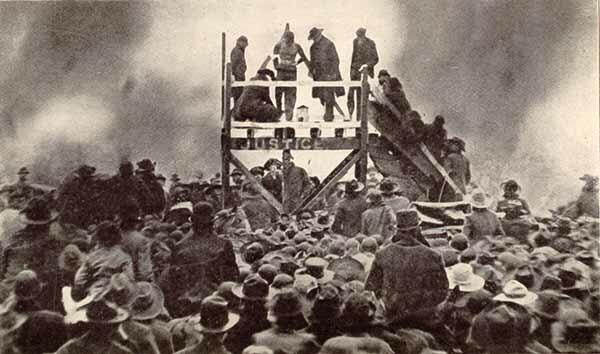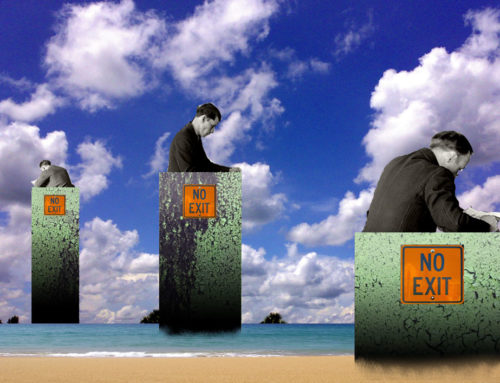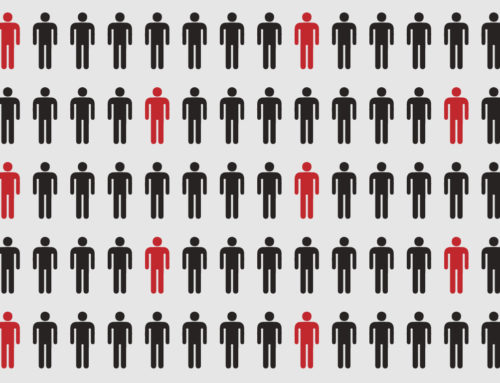By: Glen Paul Hammond
Man’s commonest weakness, [is] his aversion to being unpleasantly conspicuous, pointed at, shunned, as being on the unpopular side.
This is what Mark Twain saw as the motivation behind much of the evil that human beings perpetrate in the world. In his essay, The United States of Lyncherdom, Twain sought to understand how good, ordinary people, “the vast majority of whom are right-hearted,” could participate in the hideous act of vigilantism and the unlawful, public lynchings that took place in the United States after the American Civil War (243). It was not a deep-seated evil that resided in the hearts of individuals, according to Twain, but a herd mentality that made it impossible for any individual to oppose the group. He called it Moral Cowardice and stated that it was “the commanding feature of the make-up of 9,999 men in the 10,000… (243).” Any group spurred on in a fervor of declared moral correctness would be near impossible for any, but the strongest individuals, to oppose. Although the human propensity to belong to a group can and has been utilized for much good in the world, society must also be mindful of the fundamental flaw in the herd mentality. This article will attempt to outline this flaw and, in so doing, expose the danger it poses to liberal democracy.
Human beings are social animals and one of the consequences of this is the inevitable tension that exists “between values associated with individuality and values associated with conformity” (Aronson 13). Several empirical studies attest that even when there are no explicit constraints against individuality, the human animal’s desire to belong creates, in part, a propensity to conform. Examining a set of classic experiments in his book The Social Animal, Eliot Aronson explained that subjects were motivated by two important goals: “the goal of being correct and the goal of staying in the good graces of other people by living up to their expectations”(Aronson 20). Yet, the studies showed that, even when the group was obviously incorrect, a disproportionate amount of individuals went along. This, in essence, revealed that an individual’s desire to be part of the group overrides the need to be correct and that, as a means to resolve any inner conflict, many individuals fully adapt to the herd by proceeding to rationalize the group’s ultimate correctness. In so doing, the individual satisfies both inherent needs, and popular opinion becomes the moral compass under which the individual happily operates. This, however, is the crux of the problem. Twain’s cautionary stance against the corrupting power of moral correctness is uncomfortably close to much of the apprehension many feel today toward political correctness (PC) and his concept of the herd mentality is dangerously similar to an understanding of what is motivating the current thrust behind identity groups. Thus, the old dialogue of individuality versus tribalism is re-emerging.
Before attempting to unpack this, however, it is important to look back at the way the stratified societies of Western Europe originally organized themselves around definable group structures. The birthplace of Common Law will provide the best example, since it was from here that the special status of the individual was first incorporated into a political system.
At one time in England, as in the rest of Europe, monarchic rule was centered on an overlord, the king, and a limited number of ruling families that made up the kingdom’s aristocracy. The king was, essentially, the head of state, followed by Dukes, Marquises, Earls, Viscounts, and Barons, who each allowed the system to function through allegiances to the ranked individuals above them. In turn, the Baron’s rule was propped up by a feudal system that gave the resident lord rights to land that produced resources, which included the individuals who worked and lived on the land itself. For generations, then, individuals identified themselves according to the lord they served and the sub-groups of that larger group, including families or clans, operated in deference to a rigid class system that secured the order of its function. To put it simply, the knights, the gentry, and the peasants wore the liveries of their lord and served him in peace and war; the lords served the king who, in a best case scenario, served the ultimate interests of the kingdom.
Understanding the group structure of such a societal system, which existed for centuries in Western Europe, highlights the true significance of the following historical events; this, in turn, outlines the West’s evolution from identity group organization to liberal democracy and its emphasis on the individual.
With King John signing the Magna Carta in 1215, English barons mitigated the absolute rule of the king, increasing their own power and, effectively, making their monarch first among equals; John’s grandson, Edward I, in turn, invited commoners to what is now known as the “Parliament Barn” in Acton Burnell, allowing them to add their voices to a small gathering of the ruling class; this gave root to a democratic practice that would evolve into the inclusion of an established House of Commons; by the time of King Charles I, this governing body of “the common man” gained enough voice to directly challenge the ultimate authority of the king, leading to that king’s dissolution of the parliament, the English Civil War, the first and only execution of an anointed king of England and, in 1649, the establishment of a Republic under its Lord Protector, Oliver Cromwell; this republic ended with the death of Cromwell, whereupon a monarchy of substantially diminished power was re-established, setting in motion a series of subsequent monarchs who increasingly accepted limitations on their power.
Protecting the rights of individuals in the English Bill of Rights (1689) came out of these events and provided a central idea for English Colonialists who aspired to produce a separate state from England and, with the Age of Enlightenment’s emphasis on individual liberty, the creators of the United States Declaration of Independence took a giant step forward in the relations of man by asserting that equality of all men was self-evident. The American mission statement to protect individual rights and freedoms was, in this way, written into the very fabric of the American psyche and its function as a liberal democracy.
The legal protection of such constitutional rights and the cultural ethos that supported it, allowed the individual to step outside the safety of the group in order to pursue his own goals as well as to express his own thoughts and desires.
Yet, this begs the question: what of the individual as a social animal and the inherent need to belong to a group?
At its best, a liberal democracy, which operates under the organizing principal of a state that is both aware of, promotes, if necessary, defends its national identity and story, provides society with a group dynamic that allows the individual to flourish. It is large and fluid enough to accept the unique characteristics and idiosyncrasies of its members; in turn, each individual observes certain requisites that allow the protective system to function. These requisites are not necessarily laws, but shared values that people espouse or, more or less, accept as a necessary investment in the national project. It is, as a result, sufficient then for individuals to identify themselves as either American or Canadian etc. Since the broadness and fluidity of such a category is not so narrowly or immutably defined, two important characteristics of the west emerges: the individual does not need to sacrifice their individuality and individuals from other nations have access to membership through immigration.
Concerning this kind of symbiotic relationship between nation and individual, John Stuart Mill said, “The worth of a state, in the long run, is the worth of the individuals composing it (116).” It was not lost on Mill or any of the early proponents of such a state that freedom of thought and, subsequently, speech, was the foundation block of such a system. The logical sequence of its function can be easily rendered: The individual feels safe enough to emerge from the group and speak his mind, the idea that he speaks is critiqued by those around him, either validated or refuted, or more often than not, partially accepted and then modified by the ideas of those around him. In a best case scenario, this allows the original idea to evolve and improve, providing consensus among a group made up of individuals; at the very least, it supplies the best means to avoid violent conflict.
The democratic model that has worked so well for over two centuries protected freedom of speech and the national interest by drawing a line between freedom to express views and incitement to break laws. Thus an effective compromise was established: The laws protect the community at large and the constitutional right of freedom of speech protected individuality, ultimately allowing an individual to operate safely outside a group.
So what has changed?
Twain would argue that the “moral correctness” of the current PC movement has undermined the above compromise by asserting that speech can itself do violence or is tantamount to violence and, extending this abstract logic to its inevitable conclusion, doing violence to others is against the law. This, then, raises two subsequent concerns: Firstly, what happens if the “moral correctness” of a group will not suffer any individual to emerge with a dissenting voice? Secondly, what happens if a state weakens the legal apparatus that provides a safe platform for the individual to speak?
With regards to the first concern, Aronson states that “the absence of dissent,” conveys “the illusion of unanimity,” and this prevents “any individual from entertaining the possibility that other options might exist”(16). The historical example he cites is provided by the memoirs of Albert Speer, one of Adolf Hitler’s top advisers. According to Speer, “the circle around Hitler was one of total conformity—deviation was not permitted” (16). Speer’s memoirs state:
In normal circumstances people who turn their backs on reality are soon set straight by the mockery and criticism of those around them. In the Third Reich there were not such correctives…On the contrary, every self-deception was multiplied as in a hall of distorting mirrors…
Given the abject horror of the group dynamic described above, it seems implausible that a state would dismantle a legal and constitutional apparatus that works against such Groupthink. Yet, well intentioned hate speech laws of a generation ago are now inching their way down a slippery slope, which was the fear of many when the debate around those laws originally occurred. This, then, brings us to the second concern listed above and a return to The United States of Lyncherdom.
In his essay, Twain’s explanation for the barbarity of human behavior was based on a two-part model: One half of the model involved the lack of moral courage necessary to oppose the group and the other half manifested itself in the “inborn human instinct to imitate (243).” According to Twain, “communities as well as individuals are imitators” (242). The media guidelines for the coverage of suicide is predicated on this awareness of human behavior and are, therefore, designed to avoid what Twain identified back in 1901, that the world was “well supplied with excitable people who only need a little stirring up to make them lose what is left of their heads (241).”
Recognizing such a “copycat” instinct in the human psyche cannot help but lead one to draw modern day parallels as to the way in which social media provides a perfect platform for this disturbing phenomenon.
Applying Twain’s assertions to the current cultural reality allows for the following sequential suppositions: An individual on social media presents what becomes a “much-talked-of outrage”(242) that disturbs several others who likewise imitate and, since, according to Twain, “the world will not stop and think… it will generalize” (239), quickly a large social media group is perceived as a powerful movement and, without the state’s protection of those who would speak up to criticize, the silent majority remains silent and the movement grows, in turn, slowly reducing the numbers of those who disagree but are too afraid to speak.
In such an atmosphere, the formation of a counter group is entirely dependent on one brave individual who will speak up first and this individual is near impossible to find since that individual must be willing to sacrifice all. As Twain says, “nothing but the martyr spirit can brave a lynch mob (248).”
At one time, the political leaders of a liberal democracy were expected to uphold both the rule of law and the spirit behind it as a means to undermine mob rule. This meant that the elected leadership would do the dirty work. Acting with the full power of their office behind them, the political leader represented more than just one person. In effect, the political leader represented the constituency that elected him and so had something of the power of a group behind him. Yet, more and more, political leaders are failing to both understand and serve this function.
So what is the remedy?
Twain believed that martial personalities were necessary. Individuals so brave that they could face a mob without flinching. Describing this kind of individual as “a dauntless sheriff,” the author asserted that other brave sheriffs would follow and the “dauntless sheriff would come to be recognized as the correct” modus operandi (246). This, in turn, would encourage others to imitate and courage would become a custom that many would follow.
With regards to the tension that exists between the group and the individual, an understanding of the above is imperative. This is especially true in a time when respected well-educated intellectuals all across the west (Richard Dawkins, Jordan Peterson, Gad Saad and Ben Shapiro among them) are having planned appearances officially cancelled or deplatformed by universities simply for providing a dissenting voice. If individuals that look strikingly similar to Twain’s dauntless sheriffs are not supported in their endeavors, a very high price may have to be paid.
What is at stake is not just the free born rights of individuals that members of liberal democracies have come to expect, but the very loss of individuality itself. By not asserting that the fundamental right of an individual to speak is a manifestation of that individual’s right to think, the individual will seek the safety that only a group can offer; in turn, the group will then speak and, ultimately, also think for the individual. If this is allowed to occur, societies will establish identity groups that essentially operate as parallel cultures and a kind of tribalism will reassert itself.
Opening any history book will enlighten readers to the subsequent horrors of that kind of societal structure.
Glen Paul Hammond has a Master of Arts in English Literature from the University of Toronto. His publication credits include the educational book, The Literary Detective, and a forthcoming collection of short stories, entitled, Even the Moon is Frightened of Me, from Political Animal’s sister imprint, Crowsnest Books. Satirical cartoons and more of his writing can be found on his blog, SCRATCH.
Image: The lynching of Henry Smith, Paris, Texas, February 1, 1893
Works Cited
Aronson, Eliot. The Social Animal. 4th Ed., W.H. Freeman & Company, 1983.
Mill, John Stuart. On Liberty. 1859. 4th Ed., Longman, Roberts & Green Co., 1869. 1948.
Twain, Mark. “The United States of Lyncherdom.” 1901. The Complete Works of Mark Twain: Europe and Elsewhere. Harper & Brothers, 1923, pp. 239-250.










Leave A Comment